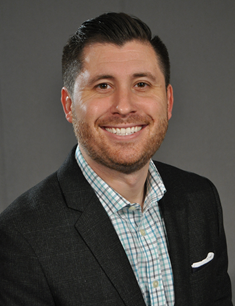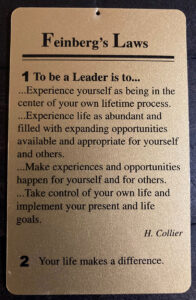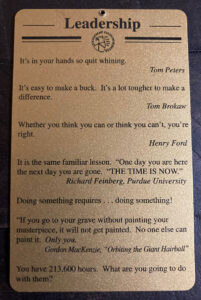Purdue alumnus finds career in selling and sales management is more than a numbers game
Written by: Rebecca Hoffa

Many people think of the pushy door-to-door salesperson stereotype when they hear the word “sales,” but for Benjamin George, a Purdue University College of Health and Human Sciences (HHS) alumnus, a career in sales means helping people.
“I think the one thing that causes people to not pursue sales and selling management is that they don’t want to be categorized as a salesperson,” George said. “I don’t think people fully understand what exists behind the title and how it can offer so much more from a career standpoint.”
George earned a bachelor’s degree in selling and sales management in 2005. He now works as the senior director of global commercial operations in clinical diagnostics at Thermo Fisher Scientific, a San Diego-based company that produces scientific and medical laboratory equipment and was a leader in manufacturing COVID-19 blood tests. From starting as an intern at Abbott Diagnostics in Chicago to advancing to where he is now, George has seen all aspects of sales in the life-sciences industry and the way it can influence the lives of countless individuals.
“A large part of what I learned at Thermo Fisher is around what we call ‘understanding the why,’” George said. “So, if I’m able to go to the hospital and get them to use our instruments, which I believe — and most likely are — better, then ultimately that helps a patient get better care. Your ‘why’ really comes down to why you believe what you are doing is helping a greater good than just making a sale.”
George said it’s important to get rid of the stigma surrounding sales careers because sales is more than just a numbers game — it’s a vital part of any business. For him, HHS’ selling and sales management program helped break down that stigma by introducing real applications of selling.
“If you want to go buy anything, there is someone who should be there to tell you why or why not to buy that product,” George explained.
George has observed how the selling and sales management program has grown since his time at Purdue to help prospective students think about selling in new ways.
“I think removing that stigma aspect is unique, and I’d love to see how the college continues to evolve,” he said.
George noted that during his time in selling and sales management at Purdue, he learned from real sales and business executives who went beyond what can be learned from a textbook. He still recalls a class he had with former Purdue adjunct lecturer and business executive Michael Trotter, who focused on real-world selling based on his experiences in the business world. George said he was always eager to go to his classes and listen to what he had to say.
“I think I was pretty hooked early on with the realness of not just hearing from professors who were teaching from a textbook but more from people who had been in that industry,” George said.


George saw the real-world impact of his education, even in the earliest stages of his career. In his first interview with Abbott Diagnostics, he was asked to participate in a role-playing scenario. All the practice he’d had acting out sales situations at Purdue helped him feel more prepared. As he participated in sales training at the company, he found more and more that the techniques he had learned were directly relatable to his career.
George sees a reminder of his Purdue education on his desk every day: a card with leadership quotes on it. It came from a leadership course taught by Richard Feinberg, professor of consumer science, who has since retired. George said Feinberg’s course was his most memorable HHS class because it was focused on soft skills and defining leadership, rather than working through more technical modules.
“When you get into larger settings — like in my last role, I had a hundred people on my team globally — that is very much less about me knowing how a product works and much more about leadership and understanding what it’s like to be in their shoes.” George said.
George credits much of his success to his experiences and training at Purdue. Throughout his career, he said, many people have been impressed by his educational background.
“Many people don’t even know that having a degree in sales is actually a thing, and it’s fun to see their reaction when they learn it is offered at Purdue,” George said.
At the end of the day, it’s ultimately passion that drives George’s career in sales. The end goal has to be more than just seeing how many things one can sell each quarter but rather being excited about developing teams, watching them grow and building relationships along the way, he said.
“It takes a lot of work to go through the training and learn the science to be a resource in the community,” said George, who has been a resource for hospitals and other medical institutions in his sales roles. “That doesn’t just come overnight. You have to want that.”
George’s main points of advice to current selling and sales management students is to have a directional path for the major with an end career goal and to never be afraid of reaching out to people at higher levels to network and learn. The Purdue network spans across so many industries that it’s not difficult to find someone from the school who is willing to offer guidance, he explained.
“I believe so much in what I have gained from my time at Purdue that at some point in time, I would love to be a part of the college and say, ‘Let me tell you exactly how this works,’” George said. “Because that’s how I think I was so prepared to go immediately into a large company and make an impact.”
Discover more from News | College of Health and Human Sciences
Subscribe to get the latest posts sent to your email.